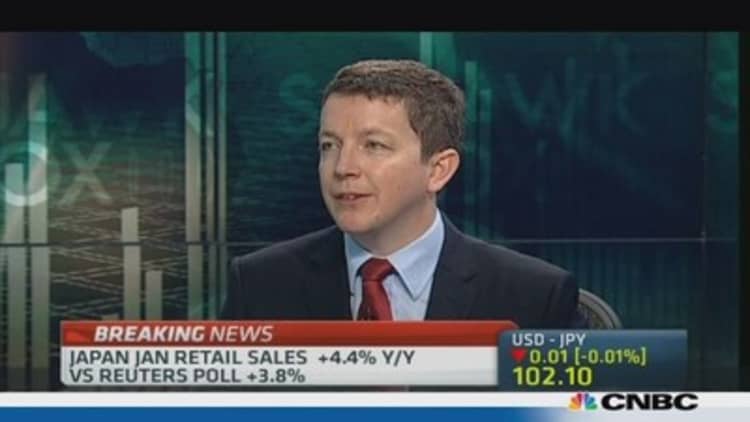
Eight straight months of price rises suggest Japan is shaking off deflation, but analysts fear that Asia's number two economy is still not getting the right kind of inflation – one underpinned by wage rises.
Core consumer prices, which strip out volatile food prices but include oil products, rose 1.3 percent in January from a year earlier, data on Friday showed. That compared with forecasts for a 1.2 percent increase and followed a 1.3 percent rise in December which was the fastest rise since October 2008.
(Read more: A good start to the year for Japan's economy)
While a comforting sign for the Bank of Japan (BOJ) and Prime Minister Shinzo Abe, hoping to revive the economy after almost two decades of deflation and poor economic growth, wage rises remain the missing piece of Japan's inflation story, analysts say.
Chris Weston, chief market strategist at trading firm IG, says that bond markets are pricing in inflation to average about 2.25 percent in Japan over the next five years, but wage growth adjusted for inflation continues to fall – a worrying sign.
"You need wage rises to grow faster than inflation to create the backbone of inflation," he said. "But so far, we have mostly imported inflation because of the weak yen."
(Read more: The most important indicator in the world right now: The yen)
The yen shed just over 20 percent of its value against the dollar last year amid aggressive monetary stimulus.
The thinking in Tokyo runs along these lines – by helping bring about a weak yen via quantitative easing, inflation expectations will start to rise while a weak currency delivers a boost to corporate Japan, which in turn plays its role in the economic revival by lifting wages that then boosts consumption.
"We are getting inflation in Japan but is it good inflation? It's mostly driven by currency weakness and energy imports," said Vishnu Varathan, a market economist at Mizuho Corporate Bank. "Whereas the brand of inflation the BOJ wants to see is really demand pull inflation, wages going up."
Data this month showed workers' total cash earnings rose 0.8 percent in December from a year earlier, a second straight month of gains and the fastest climb in nearly two years - a sign of a gradual pickup in salaries.
Still, regular pay fell 0.2 percent, down for 19 months in a row in a sign that confidence in the economic recovery has yet to fully take hold, making firms wary of increasing costs.
(Read more: Japan December wages rise year-on-year for 2nd straight month)
"You're talking about a restructuring of the mindset. It's not a question of putting the policy in place, it's about how people respond to that policy," said Will Oswald, global head of FICC Research at Standard Chartered, talking about the problems facing Japan. "You've had a long period of deflation, which means people aren't spending and the investment is not coming through."
In short, Japan's economy has made progress in the past year but the risks are still high, said analysts.
"If you look at macro issues at the moment, everyone is looking at China, but you should really be looking at Japan," said IG's Weston.
— Writing by CNBC's Dhara Ranasinghe. Follow her on Twitter at @DharaCNBC


